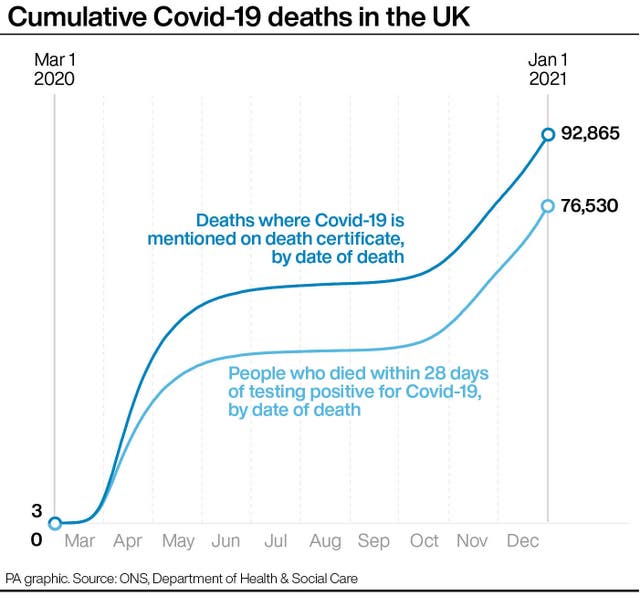Peak demand on NHS might not be until next month, MPs warned
NHS Providers chief Chris Hopson said the new strain meant the Covid-19 infection rate is not going to reduce as quickly as it did in the first wave.

Peak demand on hospitals might not be reached until “early to mid-February” amid fears “unsustainable” workloads could lead to staff leaving, MPs have been warned.
NHS Providers chief executive Chris Hopson said it was “pretty clear” the Covid-19 infection rate was not going to go down as quickly as it did during the first wave because of the new strain.
He told the Health and Social Care Select Committee that this could push the peak of NHS demand back to February and lead to a higher level and longer period of pressure.

Mr Hopson added: “We were hoping for a sharper peak that came sooner and shorter – so something, for example, where we saw the peak and started to crest it in mid-to-late January.
“It now looks like the peak for NHS demand may actually be in February.
“If that is right, that’s going to mean there’s a higher level and more extended period of pressure on the NHS.”
When asked about the peak being delayed a month, Mr Hopson said: “I wouldn’t necessarily say a month, I may say two or three weeks perhaps, so early to mid-February.”
Mr Hopson also told the committee there had been a “mismatch” in the NHS between rising demand and its capacity for 10 years, with staff expected to work “harder and harder” to cope with this increase in demand even before the pandemic.
He said that while staff will do everything they need to in the “immediate phase”, health leaders are worried about core staff leaving the health service because of the “unsustainable” workload.
He added: “We cannot keep trying to run the NHS and close that capacity-demand mismatch by effectively asking our staff to work harder and harder and harder.
“It was already pretty unsustainable before we got into Covid, it seems to us this is just really reinforcing it.
“The message we are getting very, very clearly is that people will do everything they need to do in this immediate period, because they don’t want to let their colleagues down, they don’t want to let patients down.
“All of our chief executives, they are worried that when we get through this immediate phase we will start to see people, like for example those who are near to retirement, those junior doctors or people who have come over here from overseas who wanted to train, they will leave the NHS and we will get core workers leaving in the NHS, because effectively this whole concept of trying to close that gap by asking our staff to work harder and harder and harder is creating an impossible, an unsustainable workload for our staff.”
Jeremy Dawson, professor of health management at Sheffield University, also told the committee that the NHS relied on its staff going the extra mile.
When asked how much the NHS ran on goodwill, he said: “Well, to a very large extent that has been true, especially recently, but has been true for a long time.
“One of the major challenges for the NHS is obviously how to get the best out of its staff and it has done a very good job of doing that in many ways – in some ways too good a job.
“The problem I see at the moment is that we are relying on the goodwill and going the extra mile-and-a-half of the staff in a way that is simply unsustainable.”
When asked what would happen to the NHS if staff worked to contract, Mr Hopson told the committee: “The NHS simply couldn’t cope.
“Discretionary effort is the rocket fuel that powers the NHS.
“If staff did work to contract and worked to rule, as it were, we simply would not be able to provide anything like the quality of care that we need to.”
Mr Hopson said a “fully costed, long-term, properly funded” plan for the NHS workforce was absolutely essential, and added: “If we cannot get that long-term plan in place, we have an unsustainable approach to the workforce.
“We absolutely do not have enough people working in the NHS and we need that very clear long-term plan about how we are going to grow the workforce.”





